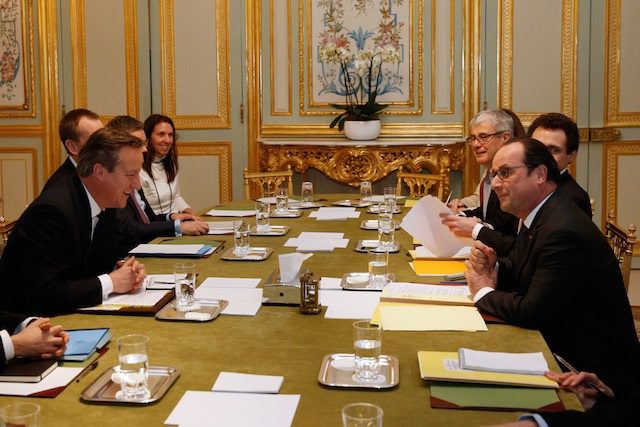SUMMARY
This is AI generated summarization, which may have errors. For context, always refer to the full article.

PARIS, France (UPDATED) – European Union chief Donald Tusk warned Monday, February 15, a so-called “Brexit” from the EU poses a real risk for the bloc, as the leaders of Britain and France struggled to hammer out a deal at hastily arranged talks.
“The risk of break-up is real because this process is indeed very fragile,” Tusk said during a visit to Romania, warning EU leaders to handle upcoming negotiations carefully because “what is broken cannot be mended”.
The former Polish prime minister, who has been on a lightening tour to dissuade Britain from leaving the EU after a referendum expected this year, warned the 28-member bloc was at a “critical moment”.
Hours later, after last-minute talks between French President Francois Hollande and British Prime Minister David Cameron in Paris, a Downing Street spokesman indicated a deal is expected at a crunch summit on Thursday and Friday (February 18 and 19).
The two leaders “agreed that we are making good progress on the UK renegotiation and that the draft text from the European Council provides a firm basis to reach agreement at this week’s summit”, the spokesman said.
The upbeat assessment came after a French official earlier warned that while there was “political willingness” to clinch an agreement, “more work is needed, particularly on economic governance”.
Britain, which does not use the euro, wants to renegotiate the terms of its EU membership to curb migration and protect it from ever having to pay into a fund to protect the eurozone, after years of debt crisis.
London also wants any issues that affect the entire EU to be discussed by all 28 member states, and not just the 19 nations that use the single currency.
France, which along with Germany is a key decision-maker in the bloc, reportedly fears this could amount to Britain having a veto over the plans of eurozone countries.
Cameron hopes to secure a deal in Brussels that could pave the way for an “in-out” referendum to be held in Britain as early as June.
The prime minister could announce the referendum date on Friday if a deal is agreed, under pressure from ministers who want to immediately declare they are against the deal and join the pro-Brexit campaign, British newspaper the Daily Telegraph reported.
A euroskeptic rally is due to be held in London on Friday evening.
‘Down to the wire’
Cameron also spoke on Monday to Tusk, who said he hopes a deal could be pushed through this week.
But whatever deal he strikes is unlikely to satisfy some factions in Britain, including some within his own Conservative Party.
The anti-EU UK Independence Party accused Cameron of being a “chicken” after he pulled out of a meeting that would have included its leader Nigel Farage.
Cameron had been expected to attend a gathering of presidents from each of the European Parliament’s groups during a visit to Brussels on Tuesday.
Instead, he will only hold bilateral meetings, including with European Parliament president Martin Schulz and three MEPs involved in the negotiations.
Even if the bloc’s leaders agree changes in areas including child benefit payments to EU migrants in Britain, as Cameron wants, the European Parliament must still approve the changes.
The EU is already facing questions about its future as it struggles with the biggest migration crisis in 70 years, and there are fresh fears about the health of the eurozone economy.
British Foreign Secretary Philip Hammond warned Sunday the EU will “lurch very much in the wrong direction” if Britain leaves, predicting negotiations at this week’s summit “would go to the wire”.
Underlining the potential ramifications of a British exit from the EU, London-headquartered HSBC hinted that the global lender could shift its operations to Paris if voters choose to leave.
“We are lucky in the sense that we have a major bank in France,” bank chairman Douglas Flint told BBC radio.
“So, if we were to leave and if there were to be restrictions, ultimately on the renegotiation of Britain’s position, we have the ability to move activity and people between London and Paris,” he said. – Hervé Asquin and Guy Jackson, AFP / Rappler.com
Add a comment
How does this make you feel?
There are no comments yet. Add your comment to start the conversation.